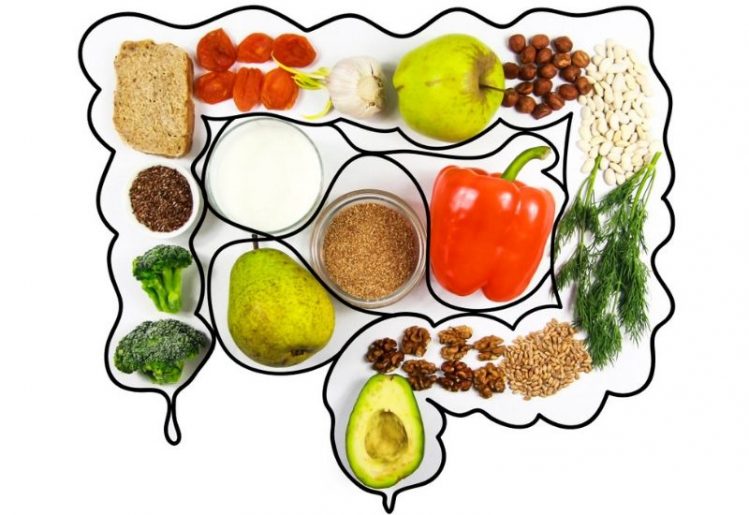Why is the Gut Microbiome So Important?
 Each person’s gut microbiome is different, depending upon the bacteria and viruses to which we have been exposed. Some of this exposure occurs in the womb, but our gut microbiome is also influenced by our diets and environmental factors. While the bacteria in each person’s body is different, it is important that every gut microbiome maintain a balance of good and bad microbes. Recent research has found that an imbalance can expose us to disease and can even weaken the immune system.
Each person’s gut microbiome is different, depending upon the bacteria and viruses to which we have been exposed. Some of this exposure occurs in the womb, but our gut microbiome is also influenced by our diets and environmental factors. While the bacteria in each person’s body is different, it is important that every gut microbiome maintain a balance of good and bad microbes. Recent research has found that an imbalance can expose us to disease and can even weaken the immune system.
It has also been found that each strand of bacteria performs a specific function. For instance, some bacterial strands have been linked to an increased risk of obesity, while other strands have been found to affect the likelihood of developing autism. When an imbalance of the gut microbiome does occur, it produces an inflammatory response in the large intestine. From there, messages are sent to the brain, which then relays messages to the central nervous system and the rest of the body.
This interaction between microbes and human cells is why it’s so important to eat a healthy, varied diet. While you do need the vitamins and nutrients that are found in natural, healthy foods, you also need the bacteria that thrive in a diverse sampling of foods. The more diverse your diet, the more diverse your gut microbiome will become. A wide variety of bacteria will help your body strengthen its immunity against a variety of illnesses.
Artificial Sweeteners Toxic to Gut Bacteria, Says New Research
A recent study, which was conducted at the Weizmann Institute of Science, looked at the effects of non-caloric artificial sweeteners (NAS) on the gut microbiome. The project involved testing mice by providing them with drinking water that was infused with high doses of artificial sweeteners. For the study, sucralose, saccharin and aspartame were used. After an 11-week trial period, the mice fed a supply of NAS-infused water experienced elevated levels of glucose intolerance. Mice in control groups, which were either fed plain water or water infused with sucrose or glucose, did not experience the same increase in glucose intolerance. The intolerance in the test mice was observed as early as eight weeks into the trial, but ultimately peaked at the 11-week point.
When compared with the gut microbiomes of healthy mice, the gut microbiomes of mice fed artificial sweeteners exhibited significant changes. One observation made during the study was that the pathways observed to be common in cases of obesity and diabetes were stronger in mice who had been subjected to NAS-infused water. Among the artificial sweeteners toxic to gut bacteria, the researchers found that saccharin was especially destructive to the gut microbiome. This NAS in particular increased glucose intolerance, while also affecting the gut bacteria known to promote obesity. With continued consumption, saccharin was found to alter certain strains of Clostridiales bacteria. These bacterial strains have been previously linked to an increased risk for type 2 diabetes.
To verify these findings, the research team used mice that were specially bred to be devoid of gut microbes. The test mice in this new group had fecal bacteria transplanted into them from mice who were fed the saccharin-infused water. In addition to developing a heightened intolerance to glucose, the test mice also developed similar bacterial changes as those of the donor mice.
Additionally, healthy gut microbiomes were transplanted from donor mice to mice who had been fed saccharin. Upon testing the mice, the researchers found that the presence of saccharin did alter the healthy gut microbiome. This confirmed that saccharin was responsible for the changes to the gut microbiomes in the other test mice. The test mice were also found to have developed glucose intolerance after receiving the transplanted gut microbiome.
Sports Drinks May Be Hazardous to Your Gut Microbiome
 In another study, researchers looked at how non-caloric artificial sweeteners would affect human subjects when consumed via sports drinks. E. coli bacteria was modified to become luminescent upon interacting with toxins. This helped the researchers determine the level of toxicity in the gut microbiome. As a result, the E. coli bacteria were able to make it evident that exposure to a NAS resulted in increased toxicity in the gut microbiome.
In another study, researchers looked at how non-caloric artificial sweeteners would affect human subjects when consumed via sports drinks. E. coli bacteria was modified to become luminescent upon interacting with toxins. This helped the researchers determine the level of toxicity in the gut microbiome. As a result, the E. coli bacteria were able to make it evident that exposure to a NAS resulted in increased toxicity in the gut microbiome.
The study indicated that artificial sweeteners can alter the bacterial balance in the large intestines, which weakens the immune system. Altered bacteria in the body also increases the chances of developing a number of medical conditions. Heart disease, autism, obesity, diabetes and many other serious medical conditions have been linked to the health of the gut microbiome.
As a whole, this research suggests a healthy diet is even more important than previously believed. To increase the health of the gut microbiome, try adding more colorful plant-based foods to your diet. Switching to whole grains and eliminating processed meats is also important. Eating naturally fermented foods and taking a probiotic supplement can also help you boost the diversity of your gut microbiome. This research also suggests replacing sugar with artificial sweeteners may not be the harmless solution most people have believed for the past two decades.
 Numerous studies have presented strong evidence that getting proper levels of certain crucial vitamins can help lower the risk of major chronic disease that comes with age. This research suggests that many health problems could be avoided by simply increasing the amount of vitamins we ingest on a daily basis.
Numerous studies have presented strong evidence that getting proper levels of certain crucial vitamins can help lower the risk of major chronic disease that comes with age. This research suggests that many health problems could be avoided by simply increasing the amount of vitamins we ingest on a daily basis. As people age, one of the biggest problems they face is decreased mobility, defined as the ability to move around independently. It has been determined that 30 percent of seniors do experience mobility problems. Mobility is often inhibited by long-term health conditions, such as lung disease, heart disease and arthritis. At the same time, with age, muscles, bones and tissue deteriorate, inhibiting mobility. Now, recent research into the link between vitamins and aging may have found a solution: A new study suggests an increased intake of vitamin K, commonly found in leafy green vegetables, may help boost mobility in seniors.
As people age, one of the biggest problems they face is decreased mobility, defined as the ability to move around independently. It has been determined that 30 percent of seniors do experience mobility problems. Mobility is often inhibited by long-term health conditions, such as lung disease, heart disease and arthritis. At the same time, with age, muscles, bones and tissue deteriorate, inhibiting mobility. Now, recent research into the link between vitamins and aging may have found a solution: A new study suggests an increased intake of vitamin K, commonly found in leafy green vegetables, may help boost mobility in seniors. A joint project, which brought together researchers from the U.K.’s University of East Anglia and Harvard University, looked at how eating blueberries affected the development of heart disease and type 2 diabetes. The research was intended to identify how blueberry consumption affected metabolic syndrome. Metabolic syndrome is a term used to describe a situation in which an individual suffers from high blood pressure, obesity and high blood sugar. Heightened triglyceride and cholesterol levels are also common in people suffering from metabolic syndrome. When these conditions are present for an extended period of time, the individual develops increased
A joint project, which brought together researchers from the U.K.’s University of East Anglia and Harvard University, looked at how eating blueberries affected the development of heart disease and type 2 diabetes. The research was intended to identify how blueberry consumption affected metabolic syndrome. Metabolic syndrome is a term used to describe a situation in which an individual suffers from high blood pressure, obesity and high blood sugar. Heightened triglyceride and cholesterol levels are also common in people suffering from metabolic syndrome. When these conditions are present for an extended period of time, the individual develops increased  In a separate experiment, rats were given proportionate doses of anthocyanin. One of the compounds produced was vanillic acid, which was found to lower blood pressure. This may indicate that blueberries can be effective in helping patients treat hypertension, though more research is needed.
In a separate experiment, rats were given proportionate doses of anthocyanin. One of the compounds produced was vanillic acid, which was found to lower blood pressure. This may indicate that blueberries can be effective in helping patients treat hypertension, though more research is needed. Before you can understand how meal timing affects blood glucose levels, it’s important to understand how
Before you can understand how meal timing affects blood glucose levels, it’s important to understand how  While the importance of eating healthy plant-based foods remains an important factor in controlling blood sugar levels, researchers have found that eating within a specific nine-hour time frame also has a noteworthy impact on blood sugar levels. In a previous research project, mice were fed a high-fat diet, but were only delivered their meals between the hours of 9:00 a.m. and 6:00 p.m. on a daily basis. The
While the importance of eating healthy plant-based foods remains an important factor in controlling blood sugar levels, researchers have found that eating within a specific nine-hour time frame also has a noteworthy impact on blood sugar levels. In a previous research project, mice were fed a high-fat diet, but were only delivered their meals between the hours of 9:00 a.m. and 6:00 p.m. on a daily basis. The  It is now well-known that obesity raises the
It is now well-known that obesity raises the  The glycemic index ranks foods based upon the effects they have on blood sugar levels. Foods that have a
The glycemic index ranks foods based upon the effects they have on blood sugar levels. Foods that have a  There are some situations that increase the likelihood of
There are some situations that increase the likelihood of  We already know that vitamin D is partly responsible for bone health and muscle growth, but could it also provide
We already know that vitamin D is partly responsible for bone health and muscle growth, but could it also provide